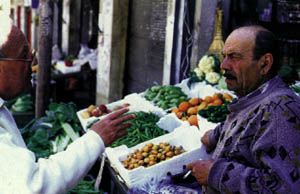Jointly published by the United States Committee for a Free Lebanon and the Middle East Forum
Back to June 2000 Table of Contents
Back to Middle East Intelligence Bulletin homepage.
Squeezed by Syria, Lebanese Farmers Struggle to Make Ends Meet
Despite its abundance of arable land, premium soil quality, plentiful water resources and mild climate, Lebanon is among the least agriculturally self-sufficient countries in the world, importing an estimated 75% of its food requirements. Each year, $1.5 billion is spent on agricultural imports, whereas exports of agricultural products bring in less than $200 million annually.
 |
| Lebanese farmers are struggling to compete with Syrian imports |
The Lebanese government bears considerable responsibility for the catastrophic stagnation of the agricultural sector. Ten years have passed since the end of the Lebanese civil war, yet agricultural output remains 20% below its 1975 level. Despite the fact that rural farmers represent 40% of the Lebanese population, only 3% of the government's annual budget is allocated to this sector. The results have been severe. Input prices have skyrocketed, forcing most farmers to rely on credit to purchase supplies at interest rates as high as 100% per year. The agricultural infrastructure of the country has decayed considerably, resulting in high production costs and inefficiency, and there is a shortage of post-harvest facilities for storing and packaging agricultural products. Much of the country's abundant rainfall and snow run-off is lost due to aging, inefficient equipment.
Speaking at the UN Food and Agriculture Organization's 25th Regional Conference for the Near East at at Beirut's Commodore Hotel in March, Prime Minister Salim al-Hoss called for "increased competition" to lower the prices of Lebanon's agricultural sector--an apparent indication that Lebanon's farmers must further tighten their belts. However, the director-general of the FAO, Jacques Diouf, told the conference that the government's neglect of the agricultural sector is "unacceptable" and that a country with Lebanon's natural resources should have a much more competitive agricultural sector.1
A primary cause of Lebanon's agricultural malaise is a direct manifestation of Syria's political control over the country: the practice of what economists call "dumping" by Damascus. Whenever Syria accumulates an overabundance of a particular agricultural commodity, it is allowed to freely rid itself of this excess. While this often results in cheaper food prices for Lebanese consumers over the short-term, it has a detrimental long-term impact on Lebanese farmers.
On May 2, around 200 farmers and agricultural laborers staged a protest in Sidon to denounce the relentless influx of Syrian produce. "What can we say about a state that turns a blind eye to foreign produce entering Lebanon illegally?" said Waddah Fakhri, the head of the Southern Farmers Association which organized the rally.2 On May 10, members of former Prime Minister Michel Aoun's Free National Current (FNC) organized demonstrations throughout the country to protest the relentless influx of agricultural produce from Syria and other countries of the region. University students sold locally-grown produce in Beirut, Baabda and Kesrouan to express their solidarity with Lebanese farmers. "It was amazing how many came to us just to buy vegetables," said FNC member Elie Hanna.3
1 Al-Nahar (Beirut), 24 March 2000.
2 The Daily Star (Beirut), 3 May 2000.
3 The Daily Star (Beirut), 11 May 2000.
� 2000 Middle East Intelligence Bulletin. All rights reserved.
MEIB Main Page

